This post is Part 2 of a three part series on how to make the Velvet Slouchy V-Neck Knit Sweater. In Part 2 we cover how to make the sleeves. Stay tuned for Part 3 were we will walk through assembly! The ad-free printable version of the complete pattern is available here.
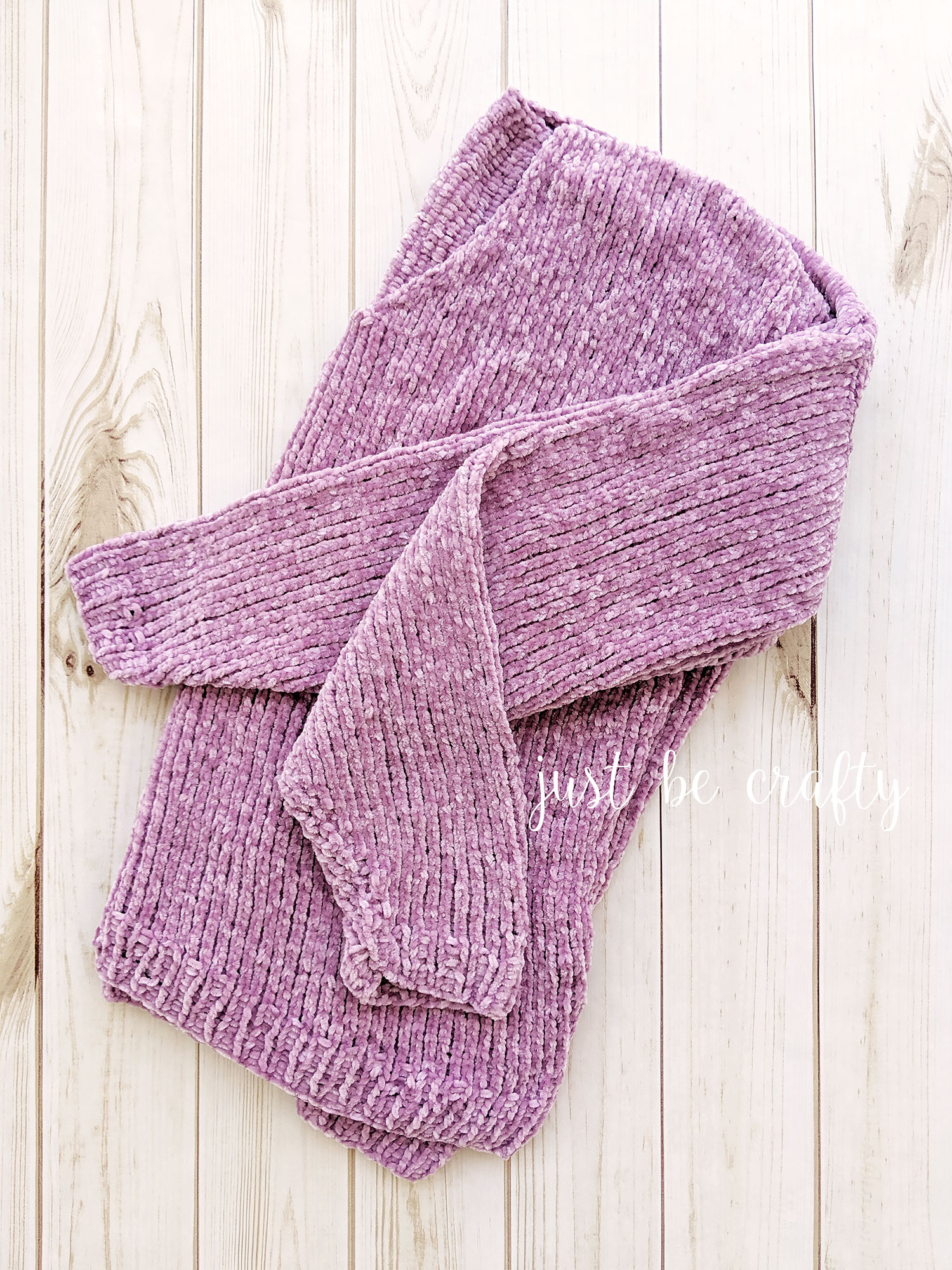
Today’s post is Part 2 of the Velvet Slouchy V-Neck Knit Sweater pattern and covers everything you need to know to make the sleeves. To continue on with the tutorial, keep reading on below!
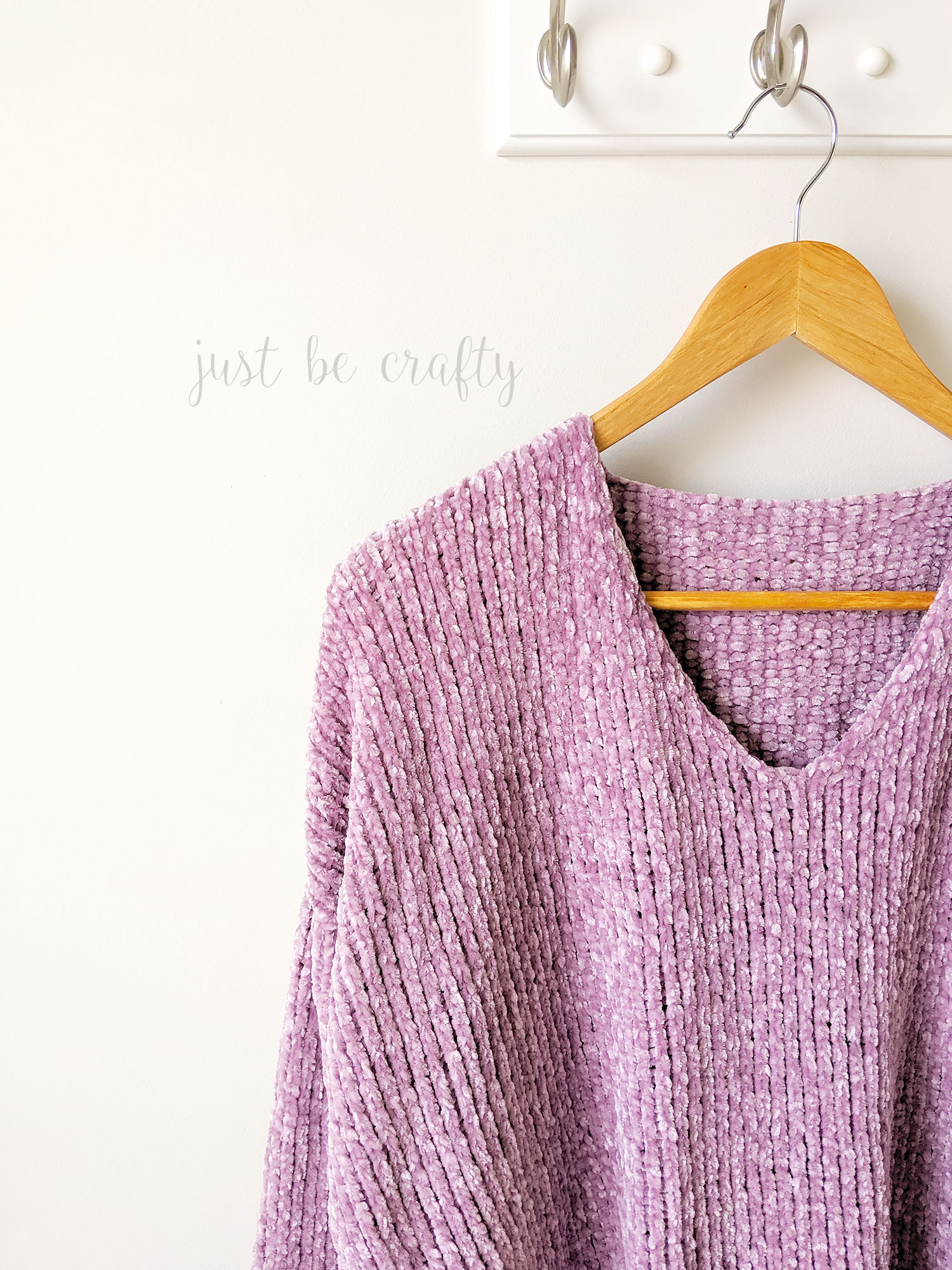
The pattern is broken up into parts…
This post is Part 2 of a three part series on how to make the Velvet Slouchy V-Neck Knit Sweater! I break the sweater down step by step through the written pattern and video tutorials so that we can knit along together!
Below is the breakdown of the series and what you can expect to learn in each part:
Part 1 – Making The Front and Back Panels
In Part 1 we covered the following to get you started on your Velvet Slouchy V-Neck Knit Sweater. If you missed this post, be sure to go back and check it out!
- Sizing and fit
- All the materials you will need for this project
- Written pattern for the front and back sweater panels
- Video tutorial to use as a companion to the written pattern
Part 2 – Making The Sleeves
Today’s post! In this post we will go over the following information:
- Video tutorial on how to make the sleeves to use in companion to the written pattern
- Written pattern for the sleeves
Part 3 – Assembly
Part 3 of this project will cover the following information and will be released on Tuesday, August 20th, 2019. Update: you can read about it here!
- Written pattern for assembly
- Video tutorial on how to assemble everything together
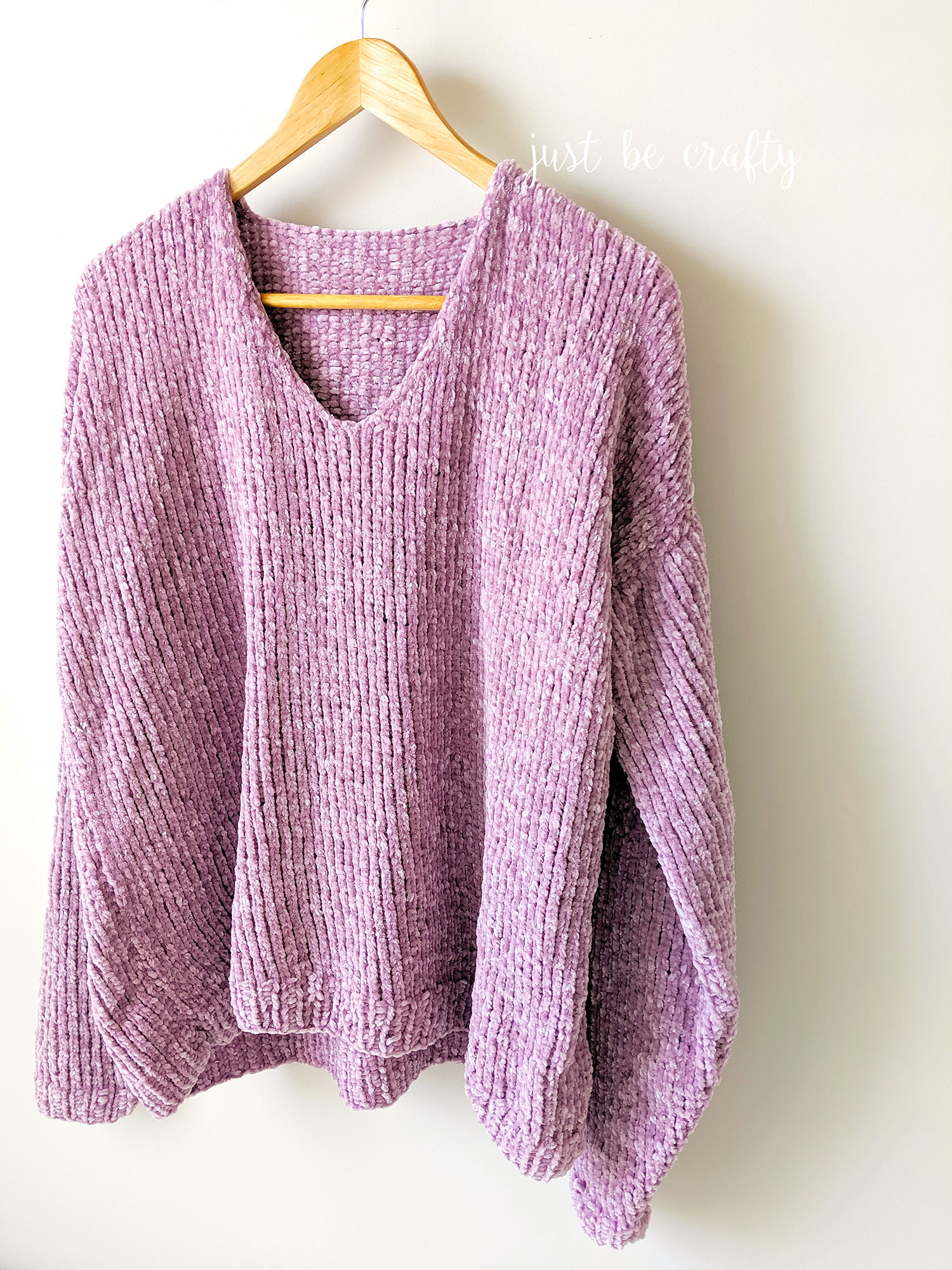
Velvet Slouchy V-Neck Knit Sweater Video Tutorial
In this video I will go over step by step how to make the sleeves for the Velvet Slouchy V-Neck Knit Sweater. This tutorial is designed for advanced beginners and higher and assumes you already know how to complete the following skills:
- Casting on
- The knit stitch
- The purl stitch
- Knit in the front and back loop increase (kfb)
- Casting off
With that said, once you’ve mastered the above skills, I am confident you can tackle this pattern!
To view the video tutorial, click on the video play button below!
Don’t have time for this now, but want to come back to the tutorial later? I have you covered…
Click here to save on Pinterest and check out it later!

Velvet Slouchy V-Neck Knit Sweater – Written Pattern: Making the Sleeves
*This post may contain affiliate links. Please see my disclosures page for more information.
All patterns on this blog are for personal use only and may not be redistributed, copied, blogged, or sold as your own. You may sell items made by my patterns as long as the item is made by you personally (not mass produced) and that proper credit is given back to me and my site, Just Be Crafty. You may not use my photos for your online sales listings.
Sizing & Finished Measurements
SIZES: XS, (S, M, L, XL, 2XL, 3XL)
Finished Measurements (in inches)
[table id=1 /]
Sizing Notes:
- The fit of this sweater is slouchy, relaxed and super comfy! Shoulders are drop seams and will lay past the shoulder on the arm. Arm is fitted around wrist and loosens up as it meets the shoulder.
- Sleeves are long and hang past wrist to mid hand, perfect for rolling to 3/4 length if desired.
- Size up or down depending on your preferred fit.
- Sweater is pictured in size XL.
- You will never want to take this sweater off!
This post may contain affiliate links. For more information please see my disclosures page.
Materials
- 29 inch circular knitting needles in US Size 7 and US Size 8
- (or grab this interchangeable set!)
- Yarn needle
- Gauge Checker
- Measuring tape
- Scissors
- Lionbrand Vel-Luxe in color Lilac, 5.3 oz / 276 yds each
- 3 (4, 4, 5, 5, 6, 7) balls
- Stitch markers
Difficulty
- Advanced beginner and higher. Click here to see all the skills you’ll need to know before tackling this project.
Gauge (after blocking)
- 13 stitches by 24 rows in Stockinette Stitch = 4 inches using US Size 8 needles
Key
- BO – bind off
- CO – cast on
- k – knit
- kfb – knit into the front and back loop increase
- p – purl
- st – stitch

The ad- free printable version of the complete pattern is available for $3.99 here.
Sleeves – worked flat (make 2)
With US Size 7 circular needle CO 23 (23, 25, 25, 25, 27, 27)
[Ribbing]
Row 1: *k1, p1; repeat from * to last stitch, k1
Row 2: *p1, k1; repeat from * until last stitch, p1
Repeat Rows 1 and 2 until ribbing measures 1.5 inches.
[Body of sleeve]
Continue with US Size 8 circular needle.
Row 1: k across row
Row 2: p across row
Row 3 (inc row): kfb, k across to last st, kfb; (25 (25, 27, 27, 27, 29, 29))
Row 4: p across row
Row 5: k across row
Row 6: p across row
XS & S ONLY
Row 7 – 10: repeat Rows 3 – 6 one more time (27, 27)
Row 11: repeat Row 3; (29, 29)
Row 12: p across row
Row 13: k across row
Row 14: p across row
Rows 15 – 20: repeat Rows 13 and 14 three more times
Rows 21 – 60: repeat Rows 11 – 20 four more times; (37, 37)
Row 61: repeat Row 11 (39, 39)
Row 62: p across row
Row 63: k across row
Row 64: p across row
Repeat Rows 63 and 64 until piece measures (19, 20) inches from cast on edge ending after completing a Row 64 repeat.
BO. Cut yarn and secure.
M ONLY
Rows 7 – 18: repeat Rows 3 – 6 three more times (33)
Row 19: repeat Row 3 (35)
Row 20: p across row
Row 21: k across row
Row 22: p across row
Rows 23 – 28: repeat Rows 21 and 22 three more times
Rows 29 – 68: repeat Rows 19 – 28 four more times; (43)
Row 69: repeat Row 19 (45)
Row 70: p across row
Row 71: k across row
Row 72: p across row
Repeat Rows 71 and 72 until piece measures 20 inches from cast on edge ending after completing a Row 72 repeat.
BO. Cut yarn and secure.
L & XL ONLY
Rows 7 – 30: repeat Rows 3 – 6 six more times; (39, 39)
Row 31: repeat Row 3 (41, 41)
Row 32: p across row
Row 33: k across row
Row 34: p across row
Rows 35 – 40: repeat Rows 33 and 34 three more times
Rows 41 – 90: repeat Rows 31 – 40 five more times; (51, 51)
Row 91: repeat Row 31 (53, 53)
Row 92: p across row
Row 93: k across row
Row 94: p across row
Repeat Rows 93 and 94 until piece measures 20 inches from cast on edge ending after completing a Row 94 repeat.
BO. Cut yarn and secure.
2XL & 3XL ONLY
Rows 7 – 38: repeat Rows 3 – 6 eight more times; (45, 45)
Row 39: repeat Row 3 (47, 47)
Row 40: p across row
Row 41: k across row
Row 42: p across row
Rows 43 – 48: repeat Rows 41 and 42 three more times
Rows 49 – 98: repeat Rows 39 – 48 five more times; (57, 57)
Row 99: Repeat Row 39 (59, 59)
Row 100: p across row
Row 101: k across row
Row 102: p across row
Repeat Rows 101 and 102 until piece measures 21 inches from cast on edge ending after completing a Row 102 repeat.
BO. Cut yarn and secure.
ALL SIZES
Your sleeves should resemble the below image.
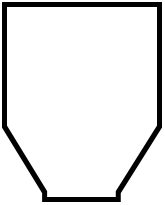
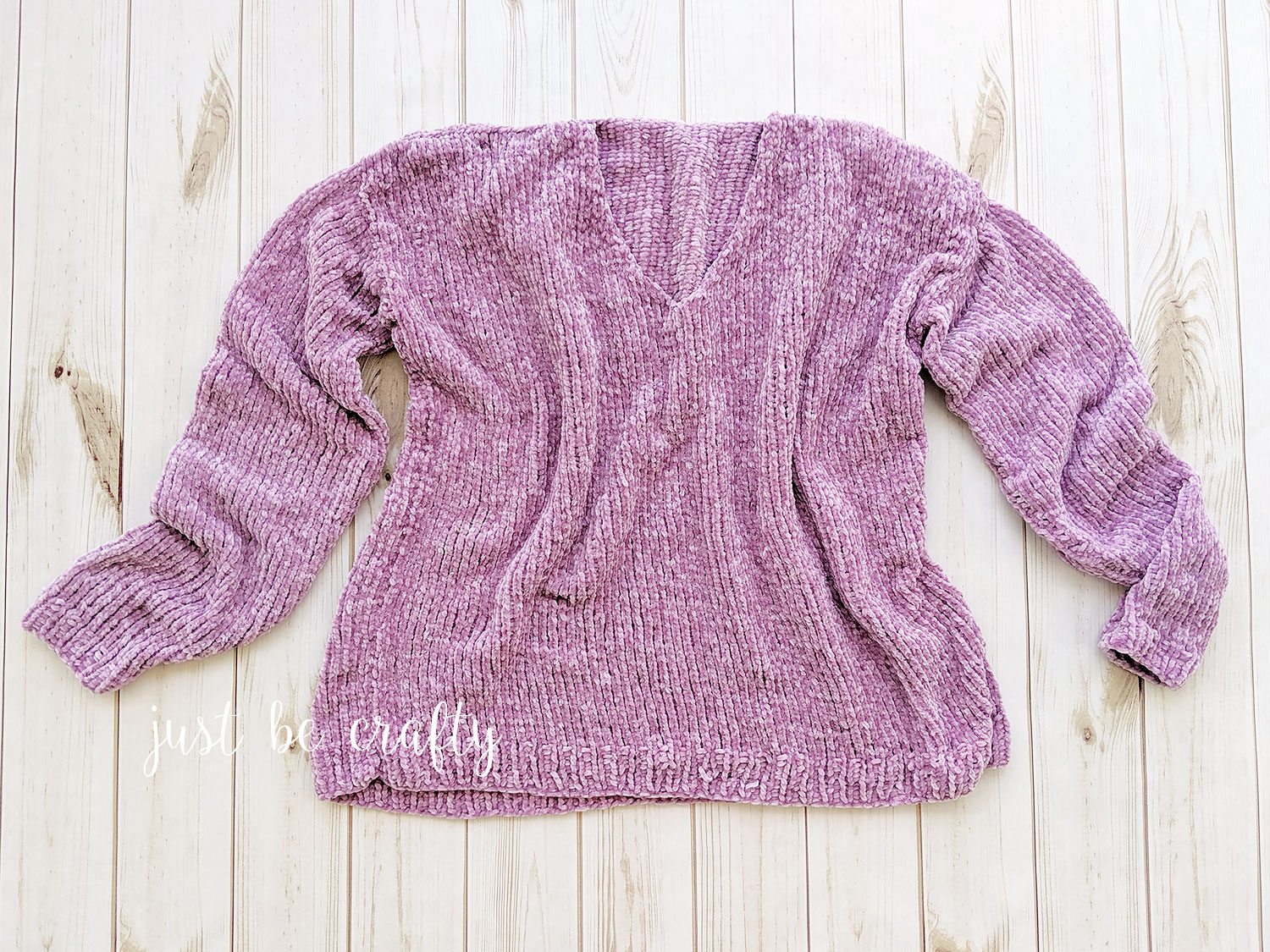
Once your finished with Part 2 of the Velvet Slouchy V-Neck Knit Sweater check back next Tuesday, August 20th when Part 3 will be released. In Part 3 we will go over how to assemble your sweater!